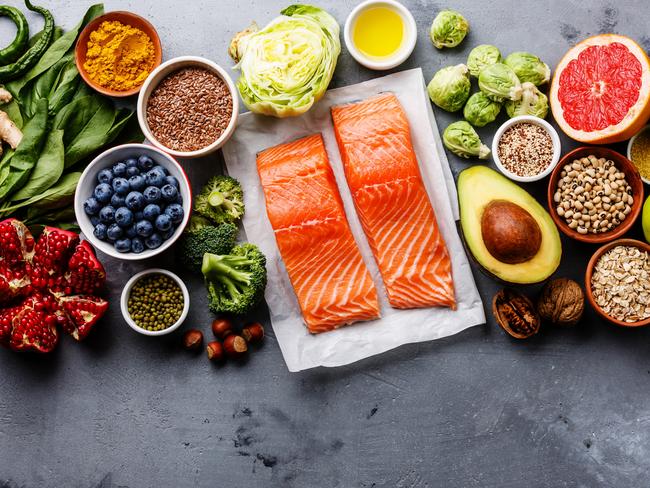How food affects your mood: Eat your way to better mental health
British nutrition guru Dr Michael Mosley — famously reversed his type 2 diabetes with the help of intermittent fasting — reveals how changing his diet helped conquer his mood issues and why food is the future of positive mental health.
When it comes to food experiments, Dr Michael Mosley is well known for putting his own body on the line in the name of research and famously reversed his type 2 diabetes with the help of intermittent fasting.
Now, with a new TV series about how Aussies can improve their health launching tomorrow, he reveals how food has been his own saviour — helping him to overcome panic attacks and periods of low mood.
“I’ve always been a bit of an introvert, but as I’ve gotten older I’ve become a little more pessimistic and prone to gloomy introspection,” Michael explains.
This propensity for low moods was compounded in 2010 when the doctor went caving during a documentary on fear and became trapped underground.

Already a little claustrophobic, he suffered a period of panic attacks as a result of the incident.
“During the attacks I’d experience a feeling of overwhelming fear, even when I was above ground. It was a remarkably unpleasant feeling because even though there was no obvious cause for concern, I’d just want to escape and try to hide,” he says.
Well versed in the techniques of mindfulness and cognitive behavioural therapy, Michael — who has a degree in psychiatry — employed these exercises to manage his anxiety and low mood, but says it was the change in his diet that really accelerated his results.
“Around the same time as the panic attacks started, I became enthusiastic about the Mediterranean diet, which is full of oily fish, nuts and vegetables; soon after I noticed those episodes began to decrease.”
MORE FROM BODY+SOUL:
HOT SPRINGS: HEALING BATHS AROUND THE WORLD
SOBER CURIOUS: IS LIFE BETTER WITHOUT ALCOHOL?
Despite experiencing improvements in his mood, Michael — who says he’s “much more positive” these days — didn’t make the food-mood connection until years later when he was conducting research for his book The Clever Guts Diet.
“I came across a study from Deakin University that showed there may be a link between food and the brain, and it was then I realised that there might be a powerful connection between the mind, the body and the gut.”
The 2017 study, known as the SMILES trial, revealed that following a Mediterranean diet could reduce depressive symptoms more effectively than participating in social-support therapy and programs.
And these findings have only become more substantial in recent years. In fact, just last month, a study by researchers from the University of Manchester found that even simple dietary changes — like eating more vegetables and less fast food — can significantly reduce the symptoms of depression and also curb anxiety in women.
MIND YOUR GUT
So, how does food affect your mood?
That’s one of the topics of Michael’s new three-part SBS documentary series, Dr Michael Mosley’s Reset, which looks at how lifestyle changes can prevent chronic disease.
“The most plausible mechanism at the moment is the effects of gut bacteria,” Michael explains.
“You have microbes in your gut that turn fibre into short-chain fatty acids, which are anti-inflammatory agents that travel through the blood to the brain.

“Researchers have found that people who suffer from depression have lower levels of certain bacteria, such as Coprococcus, and this species seems to have a pathway related to dopamine, a key brain signal involved in depression. The same microbe also makes an anti-inflammatory substance called butyrate — and increased inflammation is implicated in depression.”
While healthy foods such as fibre-rich legumes and vegetables can help reduce inflammation, processed and sugary foods can increase it — and this, Michael says, can have an adverse effect on your mood.
“There’s emerging evidence that if you eat a lot of sugar and junk food, you’re at an increased risk of anxiety,” he says.
“Sugar is like smoking — you think it improves your mood but it actually enhances negative feelings.”
Consuming an excess of processed foods is also linked to weight gain, which is another risk factor for low mood.
“For a long time we’ve known that overweight people are prone to suffer with depression, and gut fat is an inflammatory agent, which certainly drives depression,” Michael adds.
FOOD AS MEDICINE
Considering three million people across the country are currently affected by depression and anxiety, the knowledge that simple dietary tweaks can help alleviate symptoms is welcome news.
But the fact that food could help the 10 per cent of Australians currently on antidepressants stay off medication is even more exciting.
“Many patients have become wary of pill popping,” says Michael.
“There’s a move towards avoiding pills. I think there’ll be a lot more interest in food and mood because the evidence is quite powerful. It’s early days, but I’m also aware of a study at Oxford University that shows the impact of food on conditions like schizophrenia and other forms of psychosis.”

It’s important to note, though, that food isn’t a cure-all and can’t always replace medication. Instead, it’s a combination of a healthy diet, regular exercise and proven medicine that delivers the best results.
Michael believes that in the future, treatment for mood disorders like depression and anxiety will take on a multi-pronged approach — in addition to medication, treatment will also include alternative therapies, such as mindfulness, as well as personalised dietary advice.
* Catch Dr Michael Mosley’s Reset on SBS on Demand from tomorrow.
MICHAEL KNOWS BEST …
Here are some of his biggest medical breakthroughs
INTERMITTENT FASTING SLASHES YOUR RISK OF CHRONIC DISEASE
In the years since Michael stated that 5:2 intermittent fasting helps you lose weight and reduces your risk of diabetes and cognitive decline, dozens of studies have supported his claims.
RAPID WEIGHT LOSS CAN REVERSE TYPE 2 DIABETES
Michael first made this claim in his book The 8-Week Blood Sugar Diet and it was supported by a study published in The Lancet last year.
STOMACH ULCERS ARE CAUSED BY BACTERIA
In his 1994 documentary, Ulcer Wars, Michael investigated the hypothesis that the bacteria Helicobacter pylori, not stress, caused ulcers — this finding was later proven and has resulted in ulcers being successfully treated with antibiotics.
EAT THESE FOODS FOR A BETTER MOOD
Here are the best — and worst — foods for your mental health, according to science.
EAT
Salmon: Rich in omega-3 fatty acids, several studies have linked the consumption of oily fish, such as salmon, with a reduced risk of depression.
Boasting strong anti-inflammatory benefits, scientists think the omega-3 fatty acids EPA and DHA are to thank for these mood-boosting effects.

Legumes: Packed full of fibre, legumes are broken down in the gut and turned into inflammation-busting short-chain fatty acids.
Since inflammation is often linked with an increased incidence of depression and anxiety, fibre-rich foods may be able to prevent or reduce low mood.
Sauerkraut: According to research from the Food & Mood Centre, fermented foods like sauerkraut contain neurotransmitters that are essential in maintaining good mental health.

AVOID
Lollies: Sugar increases inflammation in the body and may have a negative effect on the proteins involved in creating new brain cells.
Fast food: Saturated fats in fast food can disrupt the stress-response system — a major player in depression and anxiety.


